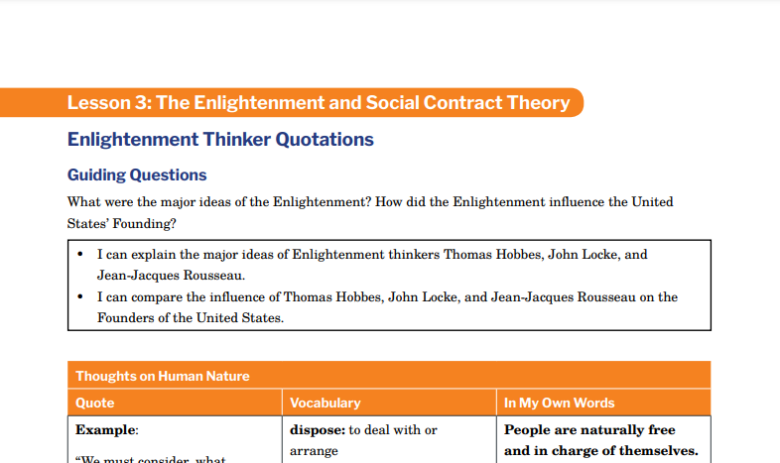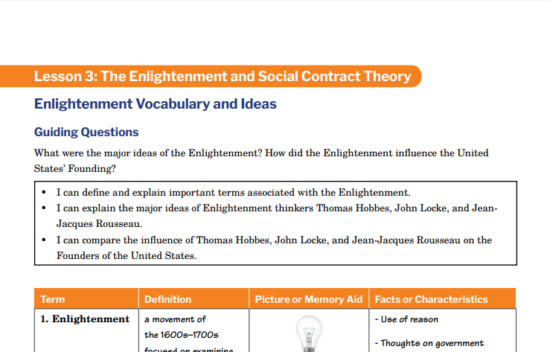Enlightenment Thinker Quotations
Guiding Questions: What were the major ideas of the Enlightenment? How did the Enlightenment influence the United States’ Founding?
- I can explain the major ideas of Enlightenment thinkers Thomas Hobbes, John Locke, and Jean-Jacques Rousseau.
- I can compare the influence of Thomas Hobbes, John Locke, and Jean-Jacques Rousseau on the Founders of the United States.
Example:
We must consider, what state all men are naturally in, and that is, a state of perfect freedom to order theiractions, and dispose of their possessions and persons, as they think fit, within the bounds of the law of nature, without asking leave, or … depending upon the will of any other man.
—John Locke, Second Treatise of Government, 1690 |
dispose: to deal with or arrange
bounds: rules
asking leave: asking permission |
People are naturally free and in charge of themselves. |
*Nature hath made men so equal in the faculties of body and mind, as that though there be found one man sometimes … stronger in body, or of quicker mind than another; yet when all is reckoned together, the difference between man and man is not so considerable.
… [D]uring the time men live without a common power … they are in that condition which is called war, and such a war, as is of every man, against every man.
—Thomas Hobbes, Leviathan, 1651 |
faculties: abilities
reckoned: considered |
|
*Man being born … with a title to perfect freedom, and an uncontrolled enjoyment of all the rights and privileges of the law of nature … hath by nature a power … to preserve his property, that is, his life, liberty and estate.
—John Locke, Second Treatise of Government, 1690 |
hath: has |
|
*No man has a natural authority over his fellow, and force creates no right.
—Jean-Jacques Rousseau, The Social Contract, 1762 |
|
|
*The only way … is to confer all their power and strength upon one man, or upon one assembly of man, that may reduce all their wills, by plurality of voices, unto one will.… For by this authority, given him by every particular man in the commonwealth, he hath the use of so much power and strength conferred on him that by terror thereof, he is enabled to perform the wills of them all, to peace at home, and mutual against their enemies abroad.
—Thomas Hobbes, Leviathan, 1651 |
confer: give
assembly: group
plurality: multiple, any
commonwealth: a group of citizens |
|
*[We have learned from] history we have reason to conclude that all peaceful beginnings of government have been laid in the consent of the people.
—John Locke, Second Treatise of Government, 1690 |
|
|
Every man being, as has been shewed, naturally free, and nothing being able to put him into subjection to any earthly power, but only his own consent.
—John Locke, Second Treatise of Government, 1690 |
shewed: showed
subjection: the state of being under the power of something |
|
[W]henever the legislators endeavor to take away, and destroy the property of the people, or to reduce them to slavery under arbitrary power, they put themselves into a state of war with the people, who are thereupon absolved from any farther obedience.
—John Locke, Second Treatise of Government, 1690 |
endeavor: try
arbitrary: false or illegitimate
absolved: excused |
|
*In the ancient republics … the people never had representatives.… [T]he moment a people allows itself to be represented, it is no longer free: it no longer exists.
—Jean-Jacques Rousseau, The Social Contract, 1762 |
|
|
Any law which the people has not ratified in person is void; it is not law at all. The English people believes itself to be free; it is gravely mistaken; it is free only during the elections of Members of Parliament; as soon as the members are elected, the people is enslaved.
—Jean-Jacques Rousseau, The Social Contract, 1762 |
ratified: approved |
|
Concluding Analysis
The Declaration of Independence (1776) begins with the following Preamble (an introductory statement):
We hold these truths to be self-evident, that all men are created equal, that they are endowed, by their Creator, with certain unalienable Rights, that among these are Life, Liberty, and the pursuit of Happiness.
Which thinker’s influence is most evident in this passage? Explain your answer.





